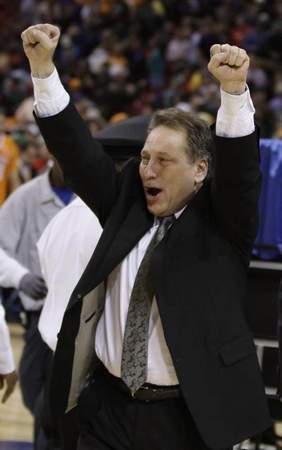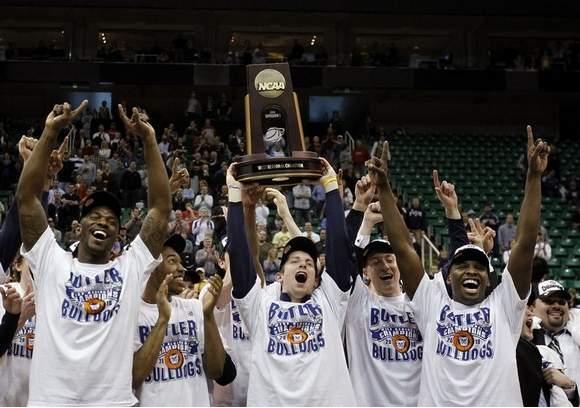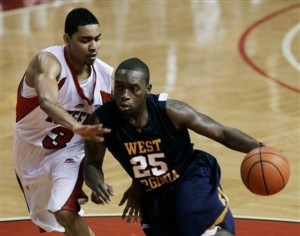
Ticket Punching. We all should have known something like this was in store by the first afternoon of the NCAA Tournament a short nine days ago. That Thursday’s early insanity portended an unpredictable week-plus that has ultimately resulted in six teams still standing, only one of whom was given serious consideration for the Final Four (Duke). Raise your hand if you had Butler and West Virginia in your Final Four, though — not even the autistic kid from Chicago had those two, and even though everyone was well aware as to the talent and capabilities of both the Bulldogs and Mountaineers, few people actually thought they could get to Indy (including us). We’ve already read several references to the “Final Snore” with respect to the relative star power of these two teams plus the prospects of a not-Duke making it tomorrow, and we really don’t want to hear it. The Tournament has been mostly chalk the last couple of years and then we heard complaints that there weren’t enough upsets. This year, we’ve had a wide-open field with any of a number of teams having a legitimate shot to win it all (remember the “there are no dominant teams” meme?), and we’re perfectly fine with that. Once in a while, the nature of this event unfolds in such a way that causes bracket mayhem, and instead of the same-old traditional power matchups, we end up with magical stories like Butler returning home to play in its first-ever Final Four and Bob Huggins leading his alma mater to same for the first time in several generations.
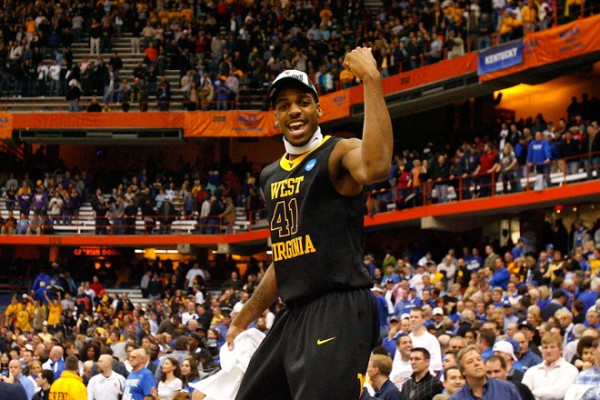
John Flowers Reps WVU's Muscle (Getty/C. Chambers)
On Knowing Yourself. #2 West Virginia 73, #1 Kentucky 66. Know thyself, the aphorism goes. Attributed to Socrates, it’s a piece of advice the Wildcats should have heeded against the Mountaineers. Everything that’s being written and discussed regarding this game revolves around Kentucky starting off at Absolute Zero from three. In fact, we’ve been hearing all season long about how Kentucky is not a “great shooting team.” Sure, an 0-20 start from beyond the arc doesn’t help, but let’s be honest. That’s an outlier. This stuff about not being able to shoot is not entirely true. Coming into this, Kentucky was the 15th best team in the nation as far as FG%, at 48.3%. That’s 15th out of 345 Division I teams. Sounds pretty great to us — but it’s not the whole story. From inside the arc, Kentucky was sixth in the nation (54.4%). From outside the arc, they drop to 34.4%. In other words, despite all the talk about how fantastic John Wall is (and he is) and how he can own a basketball game, Kentucky was and always should have been a low post-oriented team. The story isn’t that Kentucky went 4-32 (13%) from three-point range — it’s that they were taking them in the first place. Yes, that siren’s song of the open three is hard to resist. But a team with two lottery picks in the post should be looking to get the ball to the post, yes? There’s no reason that Darnell Dodson — a fine shooting guard, no question — should shoot nine shots (all of them threes) in his 12 minutes while Patrick Patterson shoots only seven shots in 37 minutes, with four of those coming from three. By the time Kentucky had gotten to 0-9, 0-10, 0-11…it was in their heads. West Virginia, on the other hand, showed total self-awareness. They relied on the exact same recipe that’s kept them in the upper reaches of the Top 25 all year long, the same recipe that earned them a Big East Conference Tournament championship. Sure, they don’t usually hit threes like they did in the first half, but after that hot start, when they cooled off, they did what they do best — drive to the hole using their inestimable athleticism. Kevin Jones, Da’Sean Butler, even hero-of-the-hour Joe Mazzulla either worked off of high screens to dart for the rim or just took their man to the hoop depending on who they had on them. Time after time, Eric Bledsoe and John Wall were left standing while the Mountaineer they were supposed to be guarding flew past them and got layups, revealing that the alleged weakness of the Kentucky guards is not their shooting, as is popularly believed — it’s that they don’t defend. Nobody’s wanted to say that all season, it seems, as if they’d be pointing out a naked emperor. But it explains the hot shooting start for WVU and the steady diet of layups the Mountaineers enjoyed. Knowing they didn’t have to guard the three as tightly, WVU then packed in that bizarre 1-3-1 zone tighter and frustrated the Wildcat bigs with physical play and quick hands. So yes, this is a shocker, and yes, maybe West Virginia shouldn’t have been in this region. But Kentucky’s players — and certainly their fans — know that UK wins this game if they play to their biggest strength. Indeed, Wall’s biggest strength is driving to the basket, and the only points of his that didn’t result from drives came on a banked-in three. But the Big Blue Nation should be happy, considering where they were last year, what they accomplished last year, and the likelihood of more fun to come. Wall, Patterson, and DeMarcus Cousins are almost certainly headed to the NBA, and you can’t blame them. Eric Bledsoe has considered the jump and there’s a lot of talk of even Daniel Orton leaving school. Our stance is that the latter two need a little more of…well, the Socratic Method. West Virginia has no such worries. And it wouldn’t matter right now, because they’re still alive. They’re going to the Final Four, and they deserve it. Why are they going instead of Kentucky? They were true to their own nature. They knew themselves.
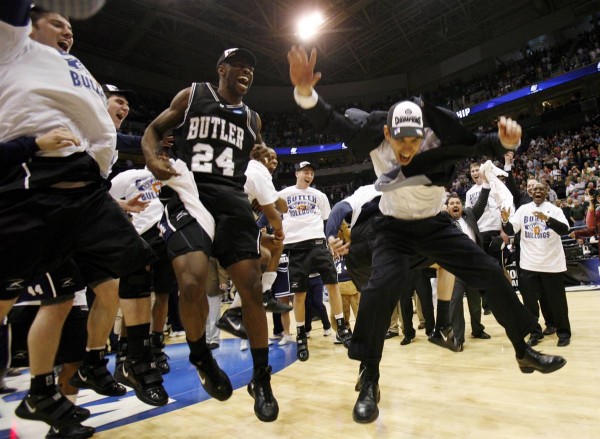
At Only 33, Butler's Brad Stevens Still Has Some Moves (Reuters/R. Galbraith)
Let’s Go Home, Shall We? #5 Butler 63, #2 Kansas State 56. Chants of “Let’s Go Home!!” echoed throughout the building, and Brad Stevens broke into dance along with his players (pictured above), and who could blame him? It wasn’t that long ago that simply making the Dance was a great accomplishment for a program like Butler. Then getting to the Sweet Sixteen was the ultimate goal. Now, with today’s methodical and defensive-minded defeat of #2 seed Kansas State, the bar has been raised to where the Final Four and beyond are what will define this plucky little program from Indianapolis. And yet, despite the difference in seeds and the obvious difference in athleticism among the players, the result today was entirely predictable based on what we’ve already seen from this Bulldog team in this Tournament. Their defense has been the story, now having held four different teams to fewer then sixty points and we’re not exactly talking about Horizon League bottom-feeders here either. Syracuse and K-State boasted two of the most efficient offenses in the nation, but the Butler preparation, focus and execution on the key scoring threats of both teams was nothing short of phenomenal. Just like the Bulldogs did on Thursday night against Andy Rautins, KSU guards Jacob Pullen and Denis Clemente could not find open looks anywhere through most of this game. The two primary scoring threats for the Wildcats ultimately connected on 11-30 field goals, but many of those came very late in the game when K-State made its final push to briefly take a lead before running out of gas. On the Butler side, it was Gordon Hayward (22/9) who was the star of the show, connecting on a wide array of jumpers, drives and even an alley-oop during this game. Shelvin Mack (16/7/3 assts) had his typically effective game, and when it came down to the last few minutes of play it was clear which team had the clearer head to make the plays needed to win. Dick Vitale is going on and on about Butler not being a Cinderella, and we agree only to the extent that they are a known commodity. But we have to be realistic, too, and programs the caliber of Butler simply do not make it to the Final Four very often, and when they do they should be celebrated as such. This isn’t UNLV in the 90s or Memphis of the last decade — this is a true mid-major school without the luxury of BCS level resources who is still getting major program results. Programs from Clemson to Colorado and USC to Georgia, would do very well to take notice of how they did it. It’s an unbelievable story and one of which we hope to report on throughout the week.





























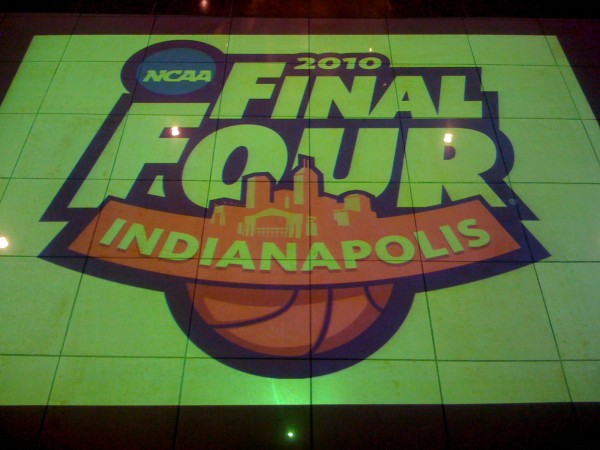
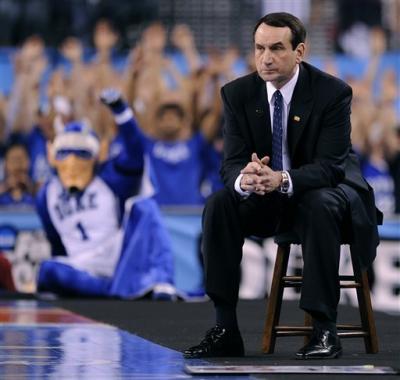
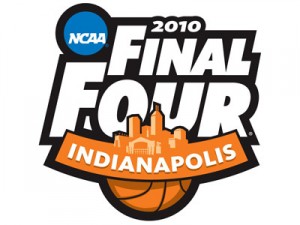
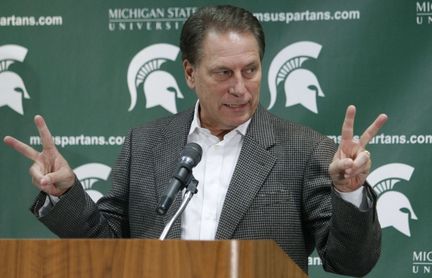
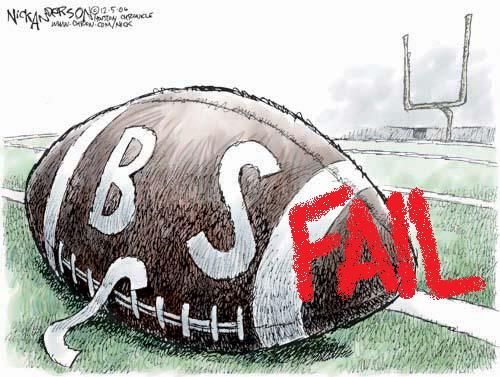
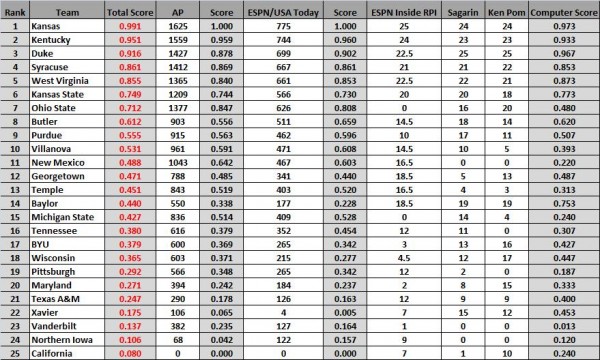
![7680039_wvirginia_v_kentucky[1]](http://rushthecourt.net/wp-content/uploads/2010/03/7680039_wvirginia_v_kentucky1.jpg)

